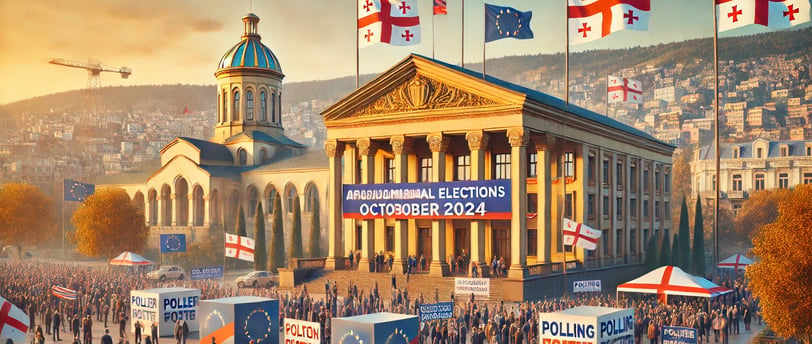Parliamentary Elections in Georgia on October 26, 2024: Political Outcomes and European Integration Prospects
The Georgian parliamentary elections on October 26, 2024, attracted considerable attention both domestically and internationally. Political parties presented different visions of the country’s future, especially regarding its European aspirations and geopolitical challenges. What are the key election outcomes, and what future path does Georgia face amid growing polarization?
LOCAL CULTURE AND HISTORYEVENTS AND FESTIVALSLIVING IN TBILISI
10/28/20243 min read


Election Results and the Position of the Ruling Party "Georgian Dream"
The ruling party Georgian Dream (GD), led by billionaire Bidzina Ivanishvili, once again secured a parliamentary majority. However, its popularity is declining, and many citizens criticize its course. Georgian Dream has pursued a balanced approach, aiming to strengthen relations with both the European Union and Russia. This “balanced” position reflects the party’s belief that a sharp pivot to the West could be risky, given the complex relationship with Moscow and potential economic repercussions.
Despite this, Georgian Dream’s stance often faces accusations of a “pro-Russian orientation,” as it emphasizes the need for dialogue with Russia. Opponents argue that this approach delays European integration and undermines support for democratic processes.
Opposition Forces: The Goal of European Integration
The opposition, including the United National Movement and other pro-European coalitions, used the elections as a platform to advocate for closer ties with the European Union. For these parties, European integration remains a crucial goal, which they see as the main path to modernizing Georgia and strengthening its democratic institutions. They view the EU as not only an economic and political partner but also a guarantee of security, especially in light of strained relations with Russia.
The pro-European opposition pledges to accelerate compliance with EU recommendations, including reforms to the judicial system, increased anti-corruption efforts, and protection of human rights. They assert that meeting these conditions will lead to negotiations for membership, bringing Georgia internal stability and international support.
Societal Polarization: Between Europe and Russia
The election results once again highlighted Georgia's deeply polarized political landscape. Georgian Dream promotes a multi-vector policy, insisting that the country should remain independent in its choices and develop relations with both the West and Russia. This approach, however, does not resonate with some who believe that a tilt towards Russia endangers Georgia’s sovereignty and its aspirations for European integration.
The opposition and a significant portion of the public question whether Georgia can avoid an increase in Russian influence without a clear pro-European stance. Critics of the multi-vector approach argue that it undermines trust in Georgia among Western allies, fosters authoritarian tendencies, and increases dependence on Moscow. Support for European integration is especially high among young people and urban residents, who see the EU as a symbol of freedom, stability, and economic opportunities.
Prospects for European Integration and EU Requirements
The European Union granted Georgia candidate status in 2023, marking an important milestone on its path toward EU membership, but the EU has set clear expectations, including strengthening democratic institutions. The EU expects Georgia to enhance its judiciary, improve anti-corruption measures, and protect citizens' rights. Significant reforms are also needed in areas such as freedom of speech and human rights to maintain Georgia’s international image as a democratic state.
The pro-European opposition views fulfilling these requirements as the only way to start negotiations for membership. Success in meeting the EU’s conditions could strengthen Georgia’s democratic development and attract foreign investment, which would, in turn, improve the country’s economic outlook.
Georgia’s Future: Scenarios and Potential Challenges
European integration remains a central objective for a significant part of Georgian society. However, Georgian Dream’s multi-vector policy raises concerns that the country could find itself at a crossroads. If Georgia chooses a path of active integration with the EU, it will face not only internal challenges but also external pressure from Russia. Given Russia's growing geopolitical interests in the region, Georgia needs to balance its democratic aspirations with the need to maintain peace.
The pro-European orientation continues to resonate with a substantial segment of Georgian society, especially among young people and urban dwellers, who see the EU as a guarantee of freedom and opportunity. However, given internal divisions and complex relations with Russia, this path will be challenging. Georgia will need unity and determination to overcome political and economic obstacles if it is to succeed on the path toward the EU.
Conclusion
The recent parliamentary elections in Georgia were an important step in the country’s democratic journey and its aspirations for European integration. While Georgian Dream seeks to maintain a balance between the West and East, the opposition and a significant portion of society favor closer cooperation with the EU and further democratic reforms. Whatever path the country chooses, the political decisions made in the coming years will shape Georgia’s future and its role in Europe.
Explore
Discover Tbilisi's culture, business, and tourism.
Connect
Engage
hello@tbilisicity.info
© 2024. All rights reserved.
